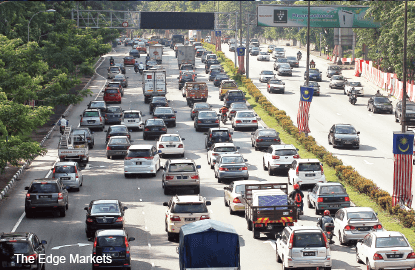
KUALA LUMPUR (Sept 20): The automotive manufacturing sector globally faces a rapidly evolving environment and rising credit risk, says Moody's Investors Service, as companies need to make material changes to more effectively reduce the sector's carbon footprint and respond to expected growth in the demand for alternative fuel vehicles (AFVs).
In a statement today, Moody's managing director Brian Cahill said given that the auto industry is one of the most significant emitters of greenhouse gases, there is a clear need for the industry to improve emissions-reducing technologies and adapt to the broadening emergence of AFVs.
Moody's, in its analysis, used a baseline emissions scenario consistent with the nationally determined contributions (NDCs) established as part of the Paris Agreement signed by 180 countries as of Sept 7.
"Although the NDC scenario is forecast to be insufficient to limit global warming to less than 2 degrees Celsius that was the commitment under the agreement, it represents a plausible central scenario, as it tracks the current policy commitments of national governments," said Cahill.
"While we use the NDC scenario as our baseline, our analysis also qualitatively considers a wider range of potential outcomes, depending upon either more or less rapid carbon transition," he added.
Moody's Corporate Finance Group vice president Motoki Yanase said major auto manufacturers face material risks, which are transmitted through four channels: rising policy pressure, with stricter emissions-reducing regulatory targets a likely outcome; increasing pressure on margins and cash flows; changing consumer preferences; and disruptive technological shocks.
Moody's said policy risk is substantial as the transport sector is a major carbon dioxide emitter. In this context, the sector needs to improve emissions-reducing technologies and adapt to the global emergence of AFVs.
The rating agency believes that regulators' increased focus on emissions compliance will accelerate the reduction of emissions.
Along with the advanced economies, many emerging economies have also introduced regulations that will likely affect the strategies of automotive manufacturers for AFVs.
"Financial risks are increasing as the manufacturers' research and development and capital spending may need to increase against the backdrop of the global push to reduce emissions and in view of the likely emergence of new competitors.
"Financially strong companies are best positioned to manage the added drain on their resources, but increased spending will likely further pressure the sector's already low margins," said Moody's.
Changing consumer preferences — such as demand for AFVs — is likely to become an important sales driver.
"We expect demand to grow amid technological improvements, incentives created under government policies and growing concerns over climate change.
"Automotive manufacturers with a broad range of AFV models and better consumer reputations for reducing emissions will be best positioned to meet this demand," said Moody's.
Finally, Moody's considers that disruptive technological shocks are possible.
"For example, the difficulty of predicting the degree and speed of AFV take-up is a significant risk for auto manufacturers because producing such vehicles will require changes to the manufacturing process and heightened coordination with auto-parts suppliers.
"Auto manufacturers without a well-developed technology strategy and ability to rapidly retool, or those with long product life cycles, will fare the worst as the need for manufacturing flexibility and speed to market rises," said the firm.
In summary, said Moody's, it is increasing its focus on the risks related to climate change for auto manufacturers globally.
"While we do not anticipate any immediate rating changes, we are monitoring rising risks in this sector for possible future implications," it said.